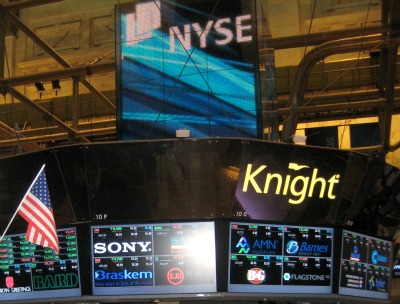Knight Capital Group saw its revenue cut in half last year, in the aftermath of the flood of erroneous orders it sent out onto the nation’s exchanges August 1.
Knight’s revenue fell to $736.1 million in 2012, from $1.4 billion in 2011, according to a filing with the Securities and Exchange Commission amending its agreement to merge with fellow market maker GETCO.
The company also reported a net loss from operations of $536.7 million, which exceeds the $456.7 million that the company has said the flood of erroneous orders cost it. All told, the company reported a net loss to its shareholders of $722.7 million, in 2012, almost matching its revenue.

On December 19, GETCO and Knight entered into a $1.4 billion agreement to merge, in which GETCO and Knight will become subsidiaries of a new publicly traded holding company.
For its part, GETCO, in the filing, reported that its earnings plunged 90 percent last year as stock-market volume fell and volatility evaporated.
Net income dropped to $16.2 million last year from $162.7 million in 2011, according to the filing.
Revenue declined 40 percent to $551.5 million, the company said.
Merging the two companies will generate savings of as much as $110 million a year through cost reductions, the companies said.
The elimination of redundancies in infrastructure and personnel will help cut expenses by $20 million to $30 million during the first year of the merger. Annual savings will increase to $90 million to $110 million by the third year.
The shares will be listed on the New York Stock Exchange under a revised plan where existing stockholders can exchange three shares for one share of the combined company. The original agreement was one for one.
The change, which doesn’t affect the total paid to Knight Capital’s shareholders, is aimed to meet NYSE’s requirement for a minimum share price of $4 at the time of listing, the companies said. Knight Capital closed at $3.74 on April 12.
The Chicago Board Options Exchange Volatility Index, known as the VIX, dropped 23 percent last year and reached a six-year low in March. Average daily volume for stocks listed on U.S. exchanges has declined every year since 2009, falling 18 percent in 2012 to a low of 6.42 billion shares, according to data compiled by Bloomberg.
That compares with 9.77 billion in 2009 and 6.30 billion so far in 2013.
Knight Capital said in January that fourth-quarter profit declined 84 percent after trading slowed and stock-price swings narrowed. The company said in February that it will reduce its workforce by 5 percent as it combines sales teams and discontinues its clearing business.





